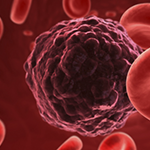PD-1 inhibition (Figure 1) has quickly become a front-line therapy for non-small cell lung cancer and melanoma. Moreover, PD-1 and PD-L1 inhibitors are being tested in combination with other checkpoint inhibitors, targeted therapies, cancer vaccines, monoclonal antibodies, and other modalities. But, how does PD-1 blunt the anti-tumor immune response? Continue reading
Tag Archives: Pembrolizumab

New data with temozolomide plus radiation for brain cancers
The results of two studies have demonstrated that the use of temozolomide (TMZ) plus radiation increases disease-free and overall survival in patients with glioblastoma and a low grade glioma called anaplastic glioma. Continue reading

Mechanisms of Melanoma Resistance to PD-1 Checkpoint Inhibition
It is estimated that about 40 percent of patients with advanced melanoma, the deadliest form of skin cancer, will initially respond to an immunotherapy, but about a quarter of those 40 percent will relapse within three years of treatment. In order to identify the mechanisms by which resistance to PD-1 inhibition is mediated, UCLA researchers studied biopsies of melanoma tumors taken before and after treatment with Keytruda (pembrolizumab) in patients whose cancer had returned. Continue reading

Neo-antigens for Cancer Immunotherapy
Two new companies have received substantial funding to pursue neo-antigens for cancer immunotherapy: Gritstone Oncology raised $102MM to pursue lung cancer and Neon Therapeutics raised $55MM to develop neoantigen-based therapeutic vaccines and T cell therapies to treat cancer. Continue reading

Cancer Immunotherapy Projections – Immune Checkpoint Inhibitors lead the way
The worldwide market for cancer immunotherapies is anticipated to grow from $1.1B in 2012 to $9B in 2022, that equals a 23/8% annual growth. Leading the growth are the immune checkpoint inhibitors.

